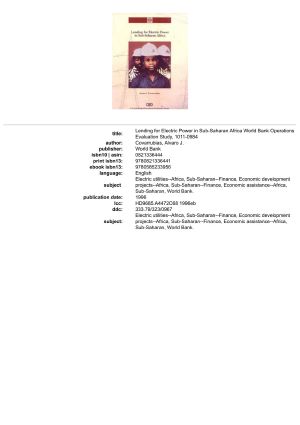Lending for Electric Power in Sub-Saharan Africa

- Authors
- Covarrubias, Alvaro & Group, World Bank
- Publisher
- World Bank Publications
- Tags
- test
- ISBN
- 9780821336441
- Date
- 1996-07-28T00:00:00+00:00
- Size
- 0.50 MB
- Lang
- en
This study investigates why Sub-Saharan Africa (SSA) continues to pose a special challenge to the World Bank in its lending for power sector development. Based on analysis of completed projects, it establishes that the sector has been plagued by low operational efficiency and failure to recover costs despite repeated injections of Bank funds. It identifies country, project, and process factors that have enhanced or inhibited progress, such as external factors and public sector weaknesses. The report also discusses factors which may positively affect the implementation of new policy guidelines, including the establishment of a transparent regulatory process, the introduction of a business orientation, and the involvement of the private sector. It also states that additional progress has recently been made due to the effectiveness of imported management services and increased country commitment to reform. The report presents principles of the Bank ' s new power sector policy which are designed to improve the impact of Bank intervention. Its six main recommendations are that: (1) country assistance strategies for SSA countries should examine the justification for power lending and establish the strategies ' coherence with other assistance priorities; (2) power lending in SSA should be avoided in countries where sector performance is below acceptable benchmarks in key technical and financial areas; (3) when promoting power sector restructuring and privatization in SSA, the Bank should explore setting up purchase tariffs, decentralizing distribution, and providing guarantees for independent power producers; (4) the Bank should nurture SSA borrower ownership of its new sector policyprinciples, of institutional development programs to support the reforms, and of delivery of technical assistance by locals and expatriates; (5) the Bank should forge strategic partnerships with other lenders and donors; and that (6) the Bank should help coordinate and institutionalize a systematic effort to gather and analyze data needed to implement the principles of the new policy. This new power sector policy, focusing on effective institutional, regulatory, and financial reform, is well adapted to Africa ' s circumstances, and there is a growing realization in SSA that reform is needed.